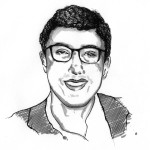It happens with enough frequency to make you wonder. You’re on the street, in a dining hall or going to class, and you say “Hi” to someone — only to get a deer-in-the-headlights look or, even more bizarre, a reciprocal “Hey” that’s uttered without eye contact. It’s like greeting a zombie. Sometimes it’s accidental, but often it’s tacitly assumed to be a normal way of greeting an acquaintance. Well, it’s not. It’s rude and highly abnormal.
 For those wondering, I’m not a freshman from the Midwest in the throes of withdrawal because everyone on the East Coast is impersonal. I grew up in New York City, where a smile or an unwarranted greeting can get you assaulted. But that’s a city. Yale is, ostensibly, a community. And there’s no reason we should be morphing into neurotic characters from Woody Allen films so early in life.
For those wondering, I’m not a freshman from the Midwest in the throes of withdrawal because everyone on the East Coast is impersonal. I grew up in New York City, where a smile or an unwarranted greeting can get you assaulted. But that’s a city. Yale is, ostensibly, a community. And there’s no reason we should be morphing into neurotic characters from Woody Allen films so early in life.
Many students arrive at Yale on day one already carrying emotional baggage. It’s to be expected that bringing together a large chunk of high school overachievers on one campus results in a pooling of intelligence — and a pooling of predictably similar neuroses. But Yale life, with its toxic brew of pressuring forces, heightens those issues. A sizeable number of students arrive on campus already susceptible to stress and anxiety. When the Yale avalanche hits, or an unexpected event catches them off guard, their vulnerability reaches a critical point.
On the very different question of character, objectively bad personality traits — like impatience, condescension, even deceit — aren’t as easily suppressed here as they are in other communities. At Yale, these qualities can run rampant because they are often rewarded: Friends lend their tacit acceptance to groupthink and narrow-mindedness, or allow one another to get away with white lies that cover up for missing commitments. It’s a four-year exercise in low to mid-level personal manipulation, just to keep the machine running smoothly. Even if people come through Yale’s gates unexposed to these maneuvers, they learn the tricks of the trade pretty soon.
But I suppose the question then becomes: So what? Maybe most Yalies’ ability to connect with people outside this life-on-steroids bubble isn’t improving, but it’s pretty easy to go through post-Yale life never having to leave the bubble. This goes almost without saying for people from elite and upper -middle class backgrounds. But it can also be true for people from low-income backgrounds. Families and friends, often the only links to the communities left behind, recede into the background as internships, fellowships and exciting job prospects take priority. Summers, and then years, fill up. You’re not the same, and it increasingly feels like they aren’t either.
Faculty and staff are just as susceptible to the perverse incentive structure rewarding self-interested behavior. Professors are not encouraged to foster meaningful relationships with students. They tend to, on the whole, exhibit excessive self-confidence (often necessary for climbing the extremely political and cutthroat academic ladder), condescension and a particularly self-righteous brand of political liberalism. Maybe it’s a survival mechanism, but it doesn’t make for the best model of academic freedom. Outliers in the faculty are out there, but they’re increasingly hard to find. Yale and its sister institutions have done a great job of exporting their most recognizable cultural product: academic self-assuredness.
All this raises the question of whether places like Yale should exist, or whether, as William Deresiewicz insists, Ivy League students would be better off attending public universities. That might be healthier for students, but his argument downplays the role brands have come to play in people’s beliefs about education and future earnings potential. The “best” school will always be the one that will make a student the most money — and that’s not likely to change.
There’s no “what we should do” part of this column. Once people are in this culture, it’s nearly impossible to go back. All I ask is that students spend some time living with people whose lives are ordered differently, instead of studying or rationalizing others’ beliefs from afar. It might help mitigate our problems. And just try, please try, to look people in the eye when saying hello.
John Aroutiounian is a senior in Jonathan Edwards College. His columns run on Tuesdays. Contact him at john.aroutiounian@yale.edu.







